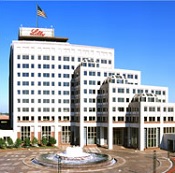 |
| Eli Lilly corporate headquarters in Indianapolis |
Eli Lilly's never-say-die strategy for Alzheimer's has inspired another high-risk campaign in the clinic. The shrinking pharma giant--about to be bumped from the top 10 by a growing Actavis ($ACT)--has launched its pivotal Phase II/III study of its BACE drug for Alzheimer's, newly partnered with AstraZeneca.
This is Lilly's ($LLY) second attempt at a BACE program after its first effort went down in flames over signs of toxicity. Lilly then shifted sights to AstraZeneca, which opted to put its BACE drug up for a partnership after refocusing its pipeline efforts. Lilly paid a modest $50 million upfront to take the lead on the pivotal program for AZD3293/LY3314814, with both companies sharing the development cost and planning to split any revenue that may be generated if the program turns out to be successful.
Success in the clinic for Alzheimer's, though, has long eluded Lilly. Aside from its failed BACE effort, there was a disastrous effort with a gamma secretase drug, followed by the high-profile Phase III flop for solanezumab, once billed as a key test of the amyloid beta theory, which proposes that a reduction in the toxic protein clusters can ameliorate the memory-destroying disease that afflicts millions of people. Lilly, though, believes it saw a strong enough sign of success in a subpopulation to justify a second Phase III effort for solanezumab. And it's taken some of the lessons learned over the years to design a Phase II/III BACE trial with better odds for success.
Investigators in this effort will try and stick with early-stage Alzheimer's patients. Earlier trial failures involving moderate-stage patients led scientists to believe that the current class of available drugs couldn't halt the decline of more advanced patients. Now the focus is on getting patients soon after diagnosis.
Lilly's shares were up about 1% in early trading today.
By inhibiting BACE investigators believe that they can interrupt a key cascade to prevent the buildup of amyloid beta plaque in the brain--which may be the cause of the disease, though there's no real consensus in the scientific community about that. There have also been lingering safety concerns about a BACE attack, with scientists red-flagging worries about the deterioration of the myelin sheath.
BACE has become the premier target in the clinic, though. Merck has the leading program with a Phase III effort now underway after its drug cleared a Phase II safety hurdle. Roche scuttled an early-stage BACE effort while Novartis ($NVS) is targeting pre-symptomatic patients with its treatment. And Biogen Idec ($BIIB) recently partnered with Eisai on E2609.
Most analysts view these Alzheimer's programs as very high risk, with limited odds of success. But they also understand that any drug that offers even a sliver of hope to patients--with so little available now--would quickly be worth billions in annual sales. AstraZeneca ($AZN) itself recently assessed the potential of this drug as a $5 billion earner, though it was willing to outlicense it in a deal with an upfront that represented just 1% of that dream.
"We're excited to take this important next step in Lilly's continuing efforts to make life better for so many people and families affected by Alzheimer's disease," said
- here's the release